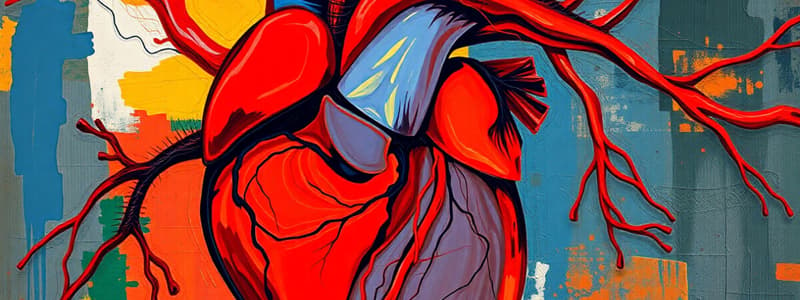Podcast
Questions and Answers
What is the primary role of the left ventricle in the cardiovascular system?
What is the primary role of the left ventricle in the cardiovascular system?
- Filling with blood during heart relaxation
- Pumping oxygen-poor blood to the body
- Receiving carbon dioxide-rich blood from the body
- Pumping oxygen-rich blood from the heart (correct)
Which statement accurately describes the blood in the right atrium?
Which statement accurately describes the blood in the right atrium?
- It is oxygen-rich and low in carbon dioxide.
- It is oxygen-rich and high in nutrient content.
- It is oxygen-poor and high in toxins.
- It is oxygen-poor and high in carbon dioxide. (correct)
What are the two loops of blood circulation in the cardiovascular system?
What are the two loops of blood circulation in the cardiovascular system?
- Body to heart and heart to lungs
- Heart to lungs and veins to body
- Heart to lungs and heart to body (correct)
- Arteries to veins and veins to heart
During the relaxation phase of the heartbeat, which event occurs?
During the relaxation phase of the heartbeat, which event occurs?
Which of the following correctly describes the structure of the heart?
Which of the following correctly describes the structure of the heart?
What is the primary function of arteries in the circulatory system?
What is the primary function of arteries in the circulatory system?
During the pulmonary circuit, where does blood flow after it leaves the right ventricle?
During the pulmonary circuit, where does blood flow after it leaves the right ventricle?
What role do lymph nodes play in the lymphatic system?
What role do lymph nodes play in the lymphatic system?
Which of the following is NOT a function of the lymphatic system?
Which of the following is NOT a function of the lymphatic system?
Which of the following statements about capillaries is correct?
Which of the following statements about capillaries is correct?
What characterizes the walls of veins compared to arteries?
What characterizes the walls of veins compared to arteries?
In the systemic circuit, what is the first step after blood passes through the left ventricle?
In the systemic circuit, what is the first step after blood passes through the left ventricle?
What is the primary role of lymphatic vessels?
What is the primary role of lymphatic vessels?
Flashcards
Cardiovascular system function
Cardiovascular system function
Delivers materials to cells, carries away wastes, and contains disease-fighting cells.
Blood vessels
Blood vessels
Tubes that carry blood to and from the heart.
Heart chambers
Heart chambers
Four hollow areas (rooms) in the heart, two atria and two ventricles.
Right atrium function
Right atrium function
Signup and view all the flashcards
Left ventricle function
Left ventricle function
Signup and view all the flashcards
Arteries
Arteries
Signup and view all the flashcards
Capillaries
Capillaries
Signup and view all the flashcards
Veins
Veins
Signup and view all the flashcards
Lymphatic System
Lymphatic System
Signup and view all the flashcards
Lymphatic Vessels
Lymphatic Vessels
Signup and view all the flashcards
Lymph Nodes
Lymph Nodes
Signup and view all the flashcards
Blood Circulation
Blood Circulation
Signup and view all the flashcards
Study Notes
Cardiovascular System Overview
- The cardiovascular system's primary role is to deliver essential materials to cells and remove waste products.
- Blood contains disease-fighting cells.
- It operates as a network of blood vessels, circulating blood from and to the heart via two main loops.
Heart Structure
- The heart has four chambers: two atria (upper) and two ventricles (lower).
- The right atrium receives oxygen-poor blood from the body.
- The right ventricle pumps this oxygen-poor blood to the lungs.
- The left atrium receives oxygen-rich blood from the lungs.
- The left ventricle pumps this oxygen-rich blood to the body.
- Note: The right side of the diagram is the heart's left side, and the left side of the diagram is the heart's right side, they are opposite.
Heartbeat Cycle
- The heartbeat involves two phases: relaxation (filling) and contraction (pumping).
- During relaxation, the atria fill with blood.
- During contraction, the heart pumps blood.
- Heart rate varies among individuals and situations.
Blood Vessels
- Blood vessels transport blood throughout the body.
- Three main types: arteries, capillaries, and veins.
- Arteries carry blood away from the heart (thick walls); aorta is the largest artery.
- Capillaries are the smallest vessels, facilitating nutrient and waste exchange with cells.
- Veins carry blood back to the heart (thin walls).
- Blood vessels contain smooth muscles.
Blood Circulation
- Blood travels in two loops: pulmonary and systemic.
Pulmonary Circulation
- Begins at the right ventricle, carrying oxygen-poor blood to the lungs.
- In the lungs, oxygen-poor blood becomes oxygen-rich.
- Oxygen-rich blood returns to the heart's left atrium, and then to the ventricle.
Systemic Circulation
- Begins at the left ventricle, carrying oxygen-rich blood to body tissues.
- In tissues, oxygen-rich blood releases oxygen and picks up waste.
- Oxygen-poor blood returns to the heart's right atrium, starting the cycle again.
Lymphatic System
- The lymphatic system is an accessory component of the cardiovascular system, having two main functions
- Drains excess tissue fluid, preventing fluid buildup in tissues
- Plays a crucial role in the immune response, fighting infections and diseases
- Includes lymphatic vessels, nodes, spleen, and thymus.
Lymphatic Vessels
- Lymphatic vessels resemble veins in structure, but are one-way streets.
- They begin as capillaries in the tissues and connect to veins.
- Lymph is the fluid that enters lymphatic vessels
Lymph Nodes
- Lymph nodes are located along lymphatic pathways.
- They act as filters, removing harmful particles from the lymph before it re-enters the bloodstream.
Studying That Suits You
Use AI to generate personalized quizzes and flashcards to suit your learning preferences.




